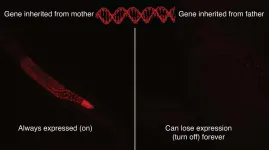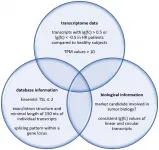(Press-News.org) Evidence suggests that what happens in one generation--diet, toxin exposure, trauma, fear--can have lasting effects on future generations. Scientists believe these effects result from epigenetic changes that occur in response to the environment and turn genes on or off without altering the genome or DNA sequence.
But how these changes are passed down through generations has not been understood, in part, because scientists have not had a simple way to study the phenomenon. A new study by researchers at the University of Maryland provides a potential tool for unraveling the mystery of how experiences can cause inheritable changes to an animal's biology. By mating nematode worms, they produced permanent epigenetic changes that lasted for more than 300 generations. The research was published on July 9, 2021, in the journal Nature Communications.
"There's a lot of interest in heritable epigenetics," said Antony Jose, associate professor of cell biology and molecular genetics at UMD and senior author of the study. "But getting clear answers is difficult. For instance, if I'm on some diet today, how does that affect my children and grandchildren and so on? No one knows, because so many different variables are involved. But we've found this very simple method, through mating, to turn off a single gene for multiple generations. And that gives us a huge opportunity to study how these stable epigenetic changes occur."
In the new study, Jose and his team found while breeding nematode worms that some matings led to epigenetic changes in offspring that continued to be passed down through as many generations as the scientists continued to breed them. This discovery will enable scientists to explore how epigenetic changes are passed to future generations and what characteristics make genes susceptible to permanent epigenetic changes.
Jose and his team began this work in 2013, while working with nematode worms, Caenorhabditis elegans (C. elegans), a species often used as a model for understanding animal biology. The scientists noticed that worms bred to carry a gene they called T, which produces fluorescent proteins, sometimes glowed and sometimes didn't. This was puzzling because the glowers and the non-glowers had nearly identical DNA.
"Everything began when we stumbled upon a rare gene that underwent permanent change for hundreds of generations just by mating. We could have easily missed it," said Sindhuja Devanapally (Ph.D. '18, biological sciences), a co-lead author of the study who is now a postdoctoral fellow at Columbia University.
To understand the phenomenon better, the researchers conducted breeding experiments in which only the mother or the father carried the fluorescent gene. The team expected that no matter which parent carried the gene, the offspring would glow. Instead, they found that when the mother carried the fluorescent gene, the offspring always glowed, meaning the gene was always turned on. But when the father carried the gene, the offspring usually weakly glowed or did not glow at all.
"We found that there are these RNA-based signals controlling gene expression," Jose said. "Some of these signals silence the gene and some of them are protective signals that prevent silencing. These signals are duking it out as the offspring develop. When the gene comes from the mother, the protective signal always wins, but when the gene comes from the father, the silencing signal almost always wins."
When the silencing signal wins, the gene is silenced for good, or for at least 300 generations, which is how long Jose and his colleagues followed their laboratory-bred worms. Previous examples of epigenetic changes were more complex or they did not last more than a couple of generations. The researchers don't yet know why the silencing signal only wins some of the time, but this new finding puts them in a much better position to explore the details of epigenetic inheritance than ever before.
"While we've found a set of genes that can be silenced almost permanently, most other genes are not affected the same way," said the study's other co-lead author, Pravrutha Raman (Ph.D. '19, biological sciences), who is now a postdoctoral fellow at Fred Hutchinson Cancer Research Center. "After silencing, they bounce back and become expressed in future generations."
With their new findings, the researchers now believe some genes could be more vulnerable to permanent epigenetic change while other genes recover within a few generations. Although studies in worms are not the same as in humans, the research provides a window into biological processes that are likely shared, at least in part, by all animals.
"The two big advantages we now have from this work are that this long-lasting epigenetic change is easy to induce through mating, and that it occurs at the level of a single gene," Jose said. "Now we can manipulate this gene and control everything about it, which will allow us to determine what characteristics make a gene susceptible or resistant to heritable epigenetic change."
Jose and his colleagues expect that future studies may one day help scientists identify human genes that are vulnerable to long-lasting epigenetic changes.
INFORMATION:
This work was supported by the National Institutes of Health (Award Nos. R01GM111457 and R01GM124356). The content of this article does not necessarily reflect the views of this organization.
Other authors of the study from UMD include biological sciences Ph.D. candidate Mary Chey, Samual Allgood (B.S. '15, biological sciences), Farida Ettefa (B.S. '18, biochemistry), Maïgane Diop (B.S. '20, biological sciences), Yixin Lin (B.S. '19, biological sciences; M.Ed. '20), Yongyi E Cho (B.S. '20, biological sciences; B.A. '20, philosophy).
The research paper, Mating can initiate stable RNA silencing that overcomes epigenetic recovery, Sindhuja Devanapally, Pravrutha Raman, Mary Chey, Samual Allgood, Farida Ettefa, Maïgane Diop, Yixin Lin, Yongyi E Cho, and Antony M Jose, was published on July 9, 2021, in the journal Nature Communications.
Media Relations Contact: Kimbra Cutlip, 301-405-9463, kcutlip@umd.edu
University of Maryland
College of Computer, Mathematical, and Natural Sciences
2300 Symons Hall
College Park, Md. 20742
http://www.cmns.umd.edu
@UMDscience
About the College of Computer, Mathematical, and Natural Sciences
The College of Computer, Mathematical, and Natural Sciences at the University of Maryland educates more than 9,000 future scientific leaders in its undergraduate and graduate programs each year. The college's 10 departments and more than a dozen interdisciplinary research centers foster scientific discovery with annual sponsored research funding exceeding $200 million.
Eyewitnesses can identify perpetrators more accurately when they are able to manipulate 3D images of suspects, according to a new study.
A team of researchers in the University of Birmingham's School of Psychology developed and tested new interactive lineup software which enables witnesses to rotate and view lineup faces from different angles.
When the eyewitnesses were able to rotate the image to match the alignment of the face in their memory, they were more likely to accurately pick out the criminal from the lineup.
Lineups are used around the globe to help police identify criminals. Typically these involve ...
Most countries have not introduced nationwide prostate-cancer screening, as current methods result in overdiagnoses and excessive and unnecessary biopsies. A new study by researchers at Karolinska Institutet in Sweden, which is published in The New England Journal of Medicine, indicates that screening by magnetic resonance imaging (MRI) and targeted biopsies could potentially cut overdiagnoses by half. The results are presented today at the European Association of Urology Congress.
"Our results from a large, randomised study show that modern methods for prostate cancer screening maintain the benefits of screening, while decreasing the harms substantially. This addresses the greatest barrier to the introduction of nationwide screening," ...
Players of the popular game Red Dead Redemption 2 learn how to identify real American wildlife, new research shows.
The game, set in the American West in 1899, features simulations of about 200 real species of animals.
The new study, by the University of Exeter and Truro and Penwith College, challenged gamers to identify photographs of real animals.
On average, RDR2 players were able to identify 10 of 15 American animals in a multiple-choice quiz - three more than people who had not played the game.
The best performers were players who had completed the game's main storyline (meaning they had played for at least 40-50 hours) ...
Oncotarget published "Transcriptome analyses of urine RNA reveal tumor markers for human bladder cancer: validated amplicons for RT-qPCR-based detection" which reported that in case of bladder cancer, urine RNA represents an early potentially useful diagnostic marker.
Here the authors describe a systematic deep transcriptome analysis of representative pools of urine RNA collected from healthy donors versus bladder cancer patients according to established SOPs.
This analysis revealed RNA marker candidates reflecting coding sequences, non-coding sequences, and circular RNAs.
Next, they designed and validated PCR amplicons for a set of novel marker candidates and tested them in human bladder cancer cell lines.
This ...
INDIANAPOLIS - A new study from U.S. Department of Veterans Affairs, Regenstrief Institute, IUPUI and Icahn School of Medicine at Mount Sinai researchers reports that primary care physicians recognize the need for better coordination and welcome health information exchange (HIE) event notifications as a means of improving the flow of information to enable provision of better patient care.
Individuals often receive medical care from more than one healthcare system. Care coordination among providers, for example after discharge from an emergency department or hospital in one system, with the patient's primary care physician in another, is ...
Should we delay covid-19 vaccination in children?
The net benefit of vaccinating children is unclear, and vulnerable people worldwide should be prioritised instead, say experts in The BMJ today.
But others argue that covid-19 vaccines have been approved for some children and that children should not be disadvantaged because of policy choices that impede global vaccination.
Dominic Wilkinson, Ilora Finlay, and Andrew Pollard say for a health system to offer any vaccine to a child, two key ethical questions must be asked. First, do the benefits outweigh the risks? Second, if the vaccine is in short supply, does someone else need it more?
"Careful attention ...
*Note: this paper is being presented at the European Congress of Clinical Microbiology & Infectious Diseases (ECCMID) and is being published in The Lancet Rheumatology. Please credit both the congress and the journal in your stories*
A new study presented at this year's European Congress of Clinical Microbiology & Infectious Diseases (ECCMID) and published in The Lancet Rheumatology, shows that the antibody - but not the T-cell - response to the first dose of the Pfizer COVID-19 vaccine is weakened in patients taking the immunosuppressant methotrexate. In contrast, antibody and T cell responses are preserved in patients taking biological drugs such as tumour necrosis factor (TNF) inhibitors.
Around 3% to 7% of people in Europe and North America have ...
*Note: this paper is being presented at the European Congress of Clinical Microbiology & Infectious Diseases (ECCMID) and is being published in The Lancet Microbe. Please credit both the congress and the journal in your stories*
A new study presented at this year's European Congress of Clinical Microbiology & Infectious Diseases (ECCMID) and published in The Lancet Microbe, shows that antibodies generated by CoronaVac, an inactivated COVID-19 vaccine, work less well against the P.1 Brazil (Gamma) variant.
It also suggests that the P.1 variant may be able to reinfect individuals who previously had COVID-19. ...
Interim data from a phase 3 trial of a COVID-19 vaccine developed in China (CoronaVac) suggests that two doses offer 83.5% protection against symptomatic COVID-19.
The preliminary findings, published in The Lancet and presented at this year's European Congress of Clinical Microbiology & Infectious Diseases (ECCMID), indicate that CoronaVac induces a robust antibody response. No severe adverse events or deaths were reported among the more than 10,000 trial participants in Turkey, with most adverse events mild and occurring within 7 days of an injection. However, more research is needed to confirm vaccine efficacy in the long term, in a more diverse group of participants, and against emerging variants of concern.
CoronaVac uses an inactivated whole virus. When people receive the vaccine, ...
Led by the London School of Hygiene & Tropical Medicine (LSHTM), in partnership with the World Health Organization (WHO) and Avenir Health, the research team carried out a systematic review and meta-analysis of syphilis prevalence among MSM between 2000 to 2020, drawing on data from 275 studies involving more than 600,000 study participants across 77 countries.
The worldwide prevalence of syphilis among MSM was 15x higher than most recent estimates for men in the general population (7.5% versus 0.5%). Researchers further estimated the prevalence across eight regions of the Sustainable Development Goals (SDG) and six regions of the WHO. Latin America and the Caribbean region had the highest prevalence of syphilis (10.6%), whereas Australia and New Zealand had the lowest (1.9%). ...




